Paper contracts used to mean long delays, lost documents, and way too much back and forth. Tools like DocuSign changed that by making it simple to sign and send agreements online.
But while DocuSign is still one of the most recognized names in e-signatures, it isn’t the only choice anymore.
Today, businesses have access to plenty of options that can match or even improve on what DocuSign offers.
Some platforms focus on speed, others bring in advanced AI features, and a few bundle signing with full document management. The point is, you’re not locked into a single provider. There are strong alternatives that might fit your workflow better.
In this guide, we’ll walk through what DocuSign does, why you might want to consider other tools, and which DocuSign competitors stand out in 2026.
If you’ve ever had to sign an agreement online, there’s a good chance you’ve come across DocuSign.
It’s one of the most widely used platforms for electronic signatures and digital signatures. At its core, it helps people close deals, approve contracts, and manage paperwork without the hassle of printing and scanning.
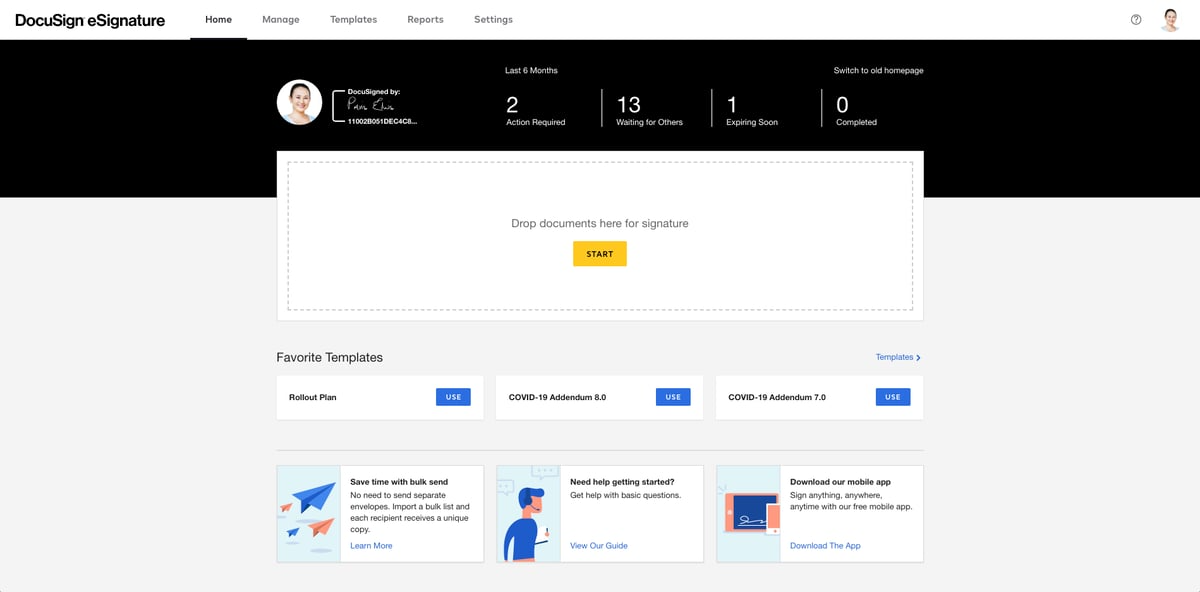
The big draw is that it supports legally binding signatures, so you can feel confident that your documents hold up in court or during audits. Many teams also like that DocuSign works for multiple users, which makes it useful for businesses of all sizes.
Some see it as a premium service, but for many companies, it’s still an affordable electronic signature solution when you consider how much time and money it saves compared to old-school processes.
Here are some of its key features:
We already know that DocuSign is a trusted name in electronic signatures, but it’s not always the perfect fit for every business.
Some teams feel the extra cost doesn’t match the features they actually use. Others want e-signature software that integrates better with their tech stack or comes with more flexible support plans.
Whatever the case may be, many companies start looking at DocuSign competitors and even explore free DocuSign alternatives before committing long-term.
A few reasons you might want to consider switching:
From affordable tools that cover the basics to platforms with advanced contract management features, there are plenty of DocuSign alternatives worth exploring:
If you’re searching for DocuSign alternatives that do more than just capture signatures, Aline should be at the top of your list.
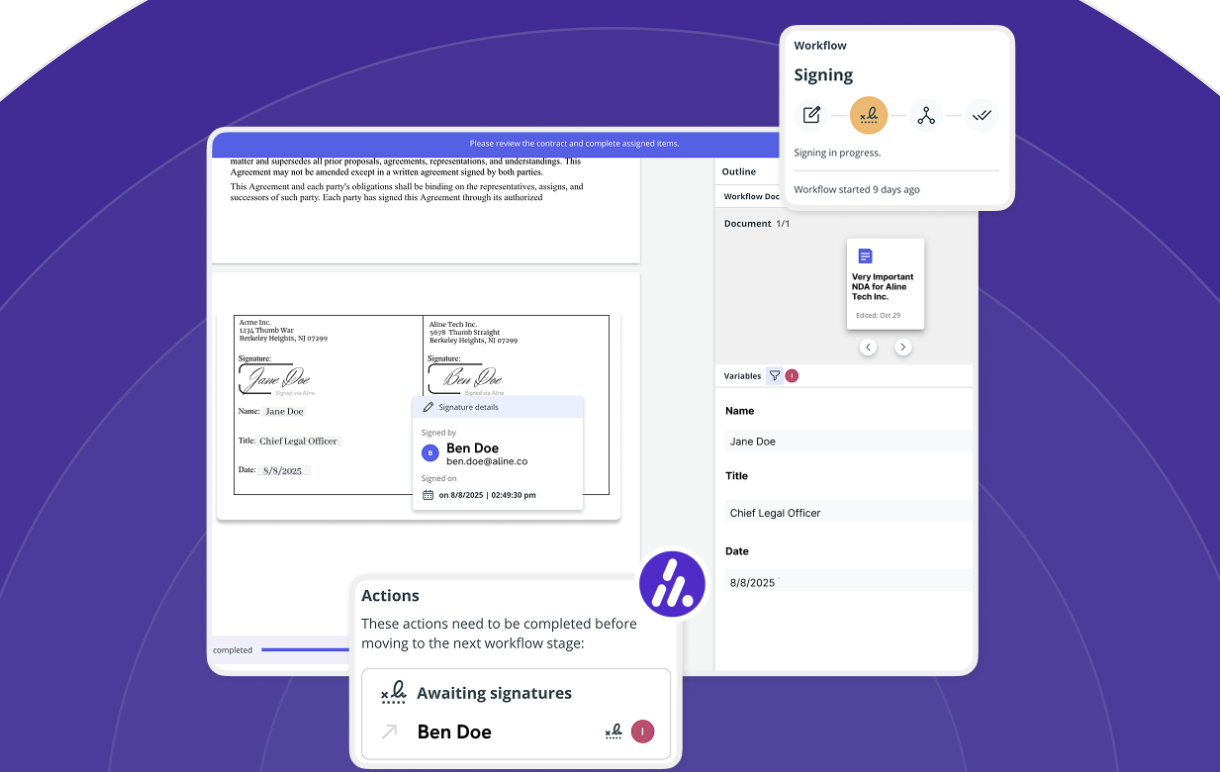
Unlike simple e-signature platforms, Aline is a full contract lifecycle management (CLM) solution powered by advanced legal AI. It’s made for in-house legal teams, sales departments, and operations leaders who want contracts drafted, reviewed, approved, and signed in a fraction of the usual time.
What sets Aline apart is its focus on speed and intelligence. With Aline AI, you can draft, redline, and analyze even the most complex agreements in minutes instead of hours.
Plus, the AI Repository gives you a central hub where every contract is stored, analyzed, and made searchable with insights pulled directly by AI.
AlineSign takes that further by keeping signing fully embedded inside the contract workflow. Agreements are signed where they’re drafted and approved, with executed copies automatically stored alongside version history and audit trails.
Unlimited compliant e-signatures are included at one predictable price, with no per-envelope limits. AlineSign supports Word and PDF files, records approval paths with timestamps, and meets ESIGN and eIDAS requirements with SOC 2–certified security built in.
Thousands of legal and business users already rely on Aline to close deals faster and gain back hours every week. Don't get left behind.
For businesses already deep into Adobe’s ecosystem, Adobe Sign is a logical step. It’s part of the Adobe Document Cloud, which means you get more than just electronic signatures.
You also gain comprehensive document management solutions built right into the apps you use every day.
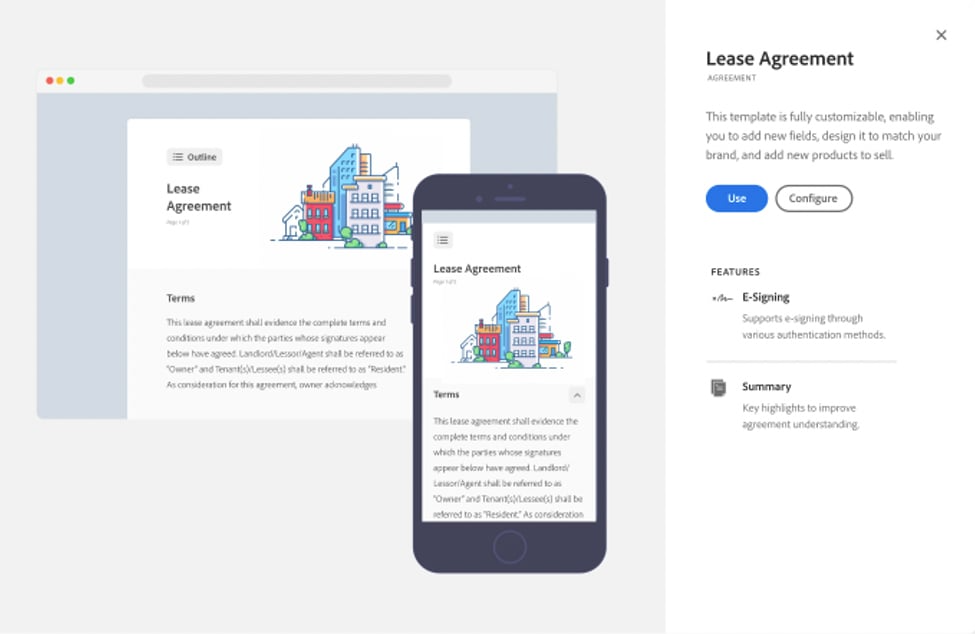
Many former DocuSign users switch to Adobe because it feels familiar and works smoothly with other apps like Microsoft 365, Google Workspace, and, of course, Adobe Acrobat.
Teams on a business plan often find it convenient that contracts can be drafted, shared, signed, and stored without leaving their preferred workflows.
Formerly known as HelloSign, Dropbox Sign is a straightforward option for individuals and businesses that want an easy way to sign agreements and send documents.
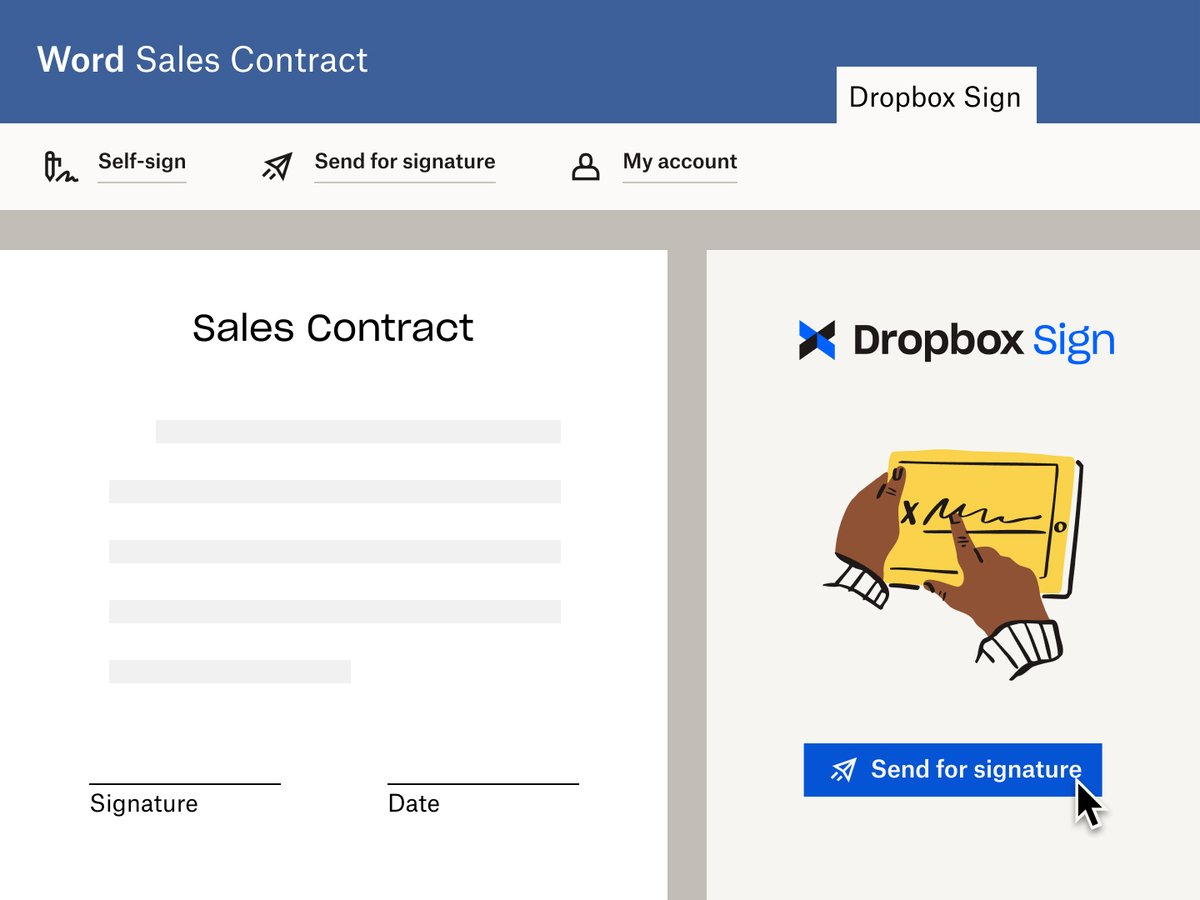
It’s especially appealing if you already use Dropbox for contract storage since it integrates directly into your files. And for freelancers and small teams, the personal plan offers simple, affordable access to e-signatures without extra complexity.
Because everything lives inside Dropbox, managing PDF documents feels familiar. Signed files stay in your existing folders, which creates a simple document library without extra setup.
For teams with basic needs, that approach works well, though larger organizations may notice limited features when it comes to advanced workflows or contract automation.
Xodo Sign gives you everything you’d expect from a modern e-signature tool: legally binding e-signatures, a clear digital audit trail, and flexible pricing that grows with your team.
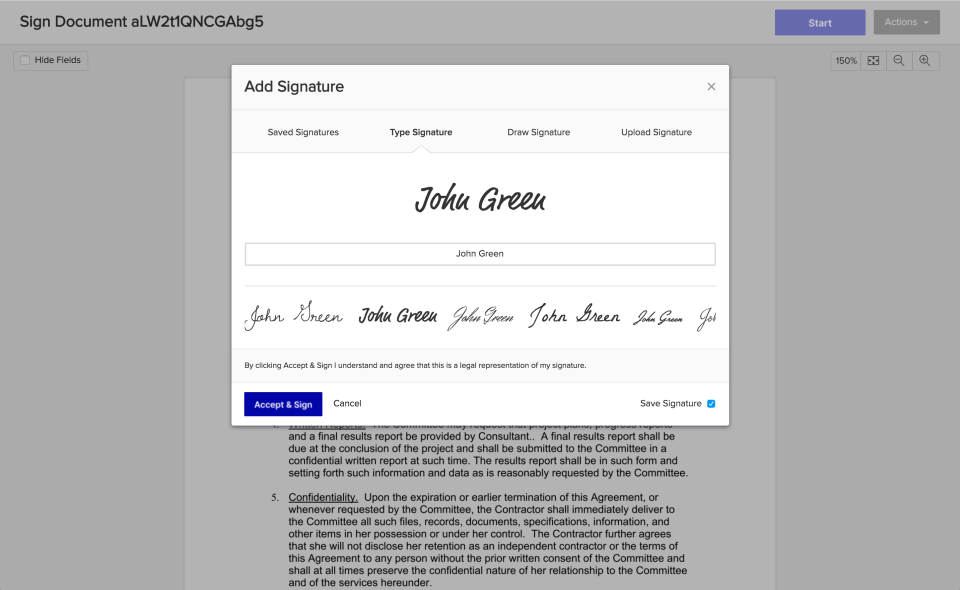
If you’re running a small business, you can start on a basic plan with five documents a month. But as your needs expand, the professional plan makes it easy to add more users, branding, and advanced features without switching platforms.
Xodo Sign works well for creating documents and handling digital documents tied to everyday business contracts.
While it isn’t a full document editor, it supports common document workflows, especially when preparing agreements for signing and keeping records organized across your team.
Teams that work heavily with proposals, quotes, and contracts often turn to PandaDoc as a DocuSign alternative. It goes beyond basic e-signatures by focusing on document creation and contract collaboration.
With Google Docs integration, a simple drag-and-drop tool, and plenty of reusable templates, you can put together professional documents in just a few minutes.
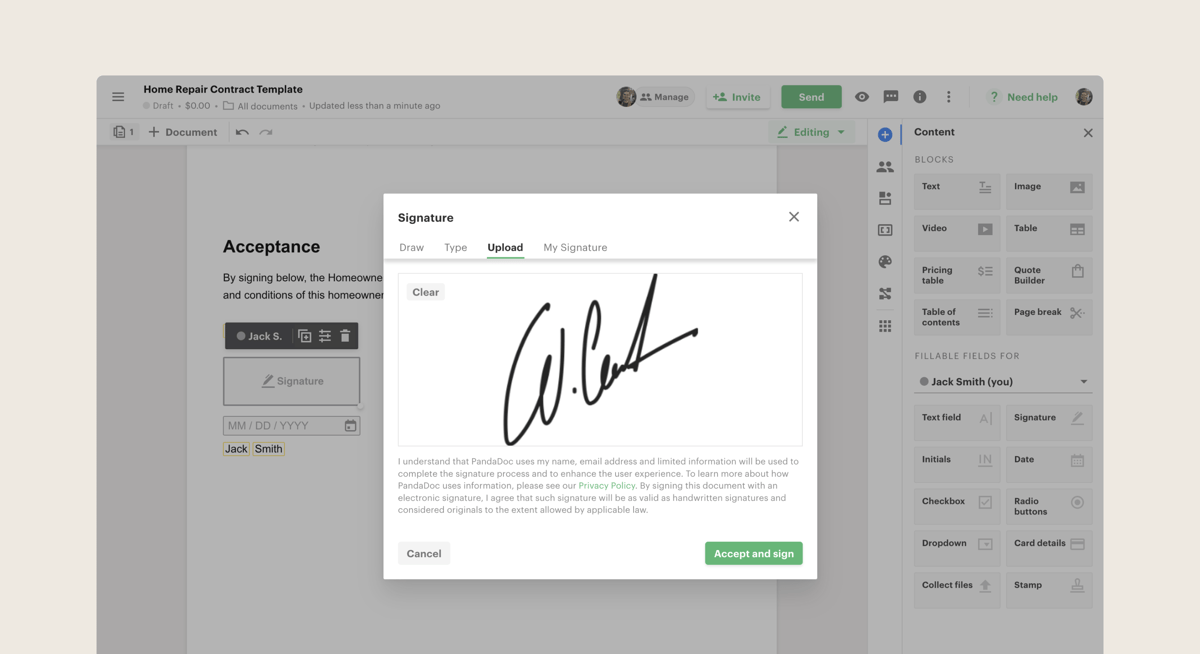
PandaDoc also helps track engagement, collect payments, and manage the process to renew contracts. These capabilities make it especially useful for sales and operations teams that need everything in one place.
When businesses look for DocuSign alternatives that balance affordability with functionality, SignNow often makes the shortlist. It’s designed for companies that need to move contracts quickly without giving up flexibility.
For example, a sales team can prepare and send agreements in minutes, while still keeping documents polished through custom branding.
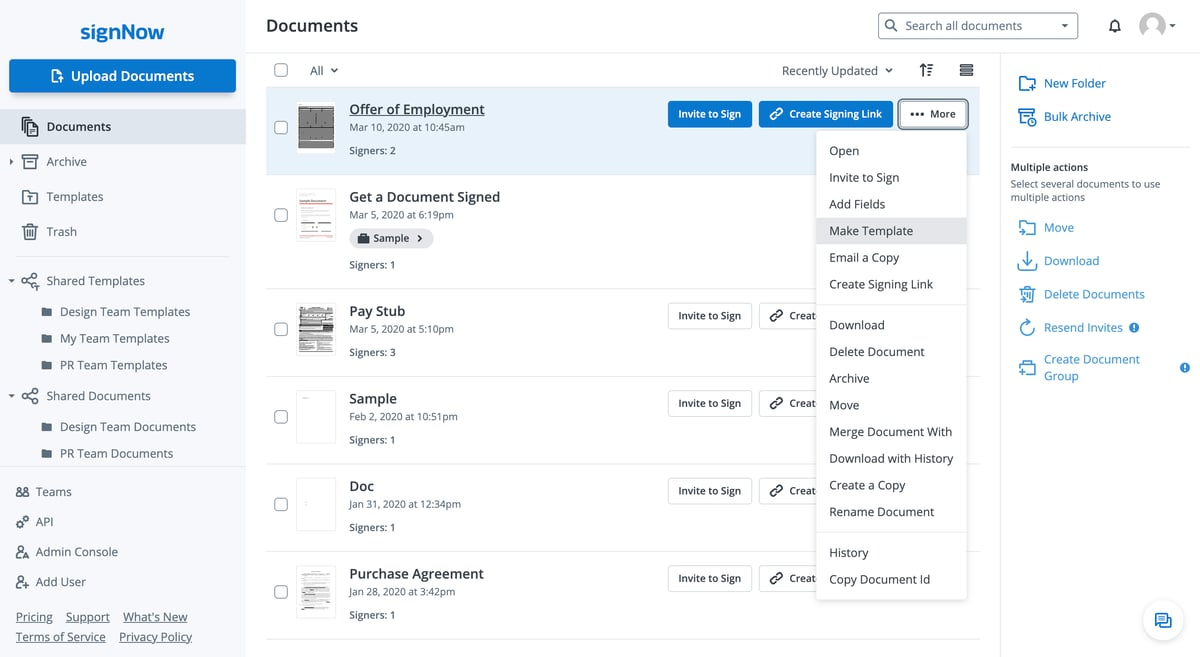
Beyond that, SignNow plays well with everyday tools. You can pull in files directly from Google Docs, handle PDF files with ease, and even send contracts in bulk when you’re dealing with large groups of clients.
SignNow also supports advanced electronic signatures to give teams more control over how agreements are prepared and approved.
Unlike DocuSign, its pricing and feature structure appeal to companies that want strong signing capabilities without committing to higher-tier plans too early.
Juro is an all-in-one platform to manage your entire document workflow. Unlike some competitors, Juro combines contract creation, editing, collaboration, and signing in one browser-based workspace.
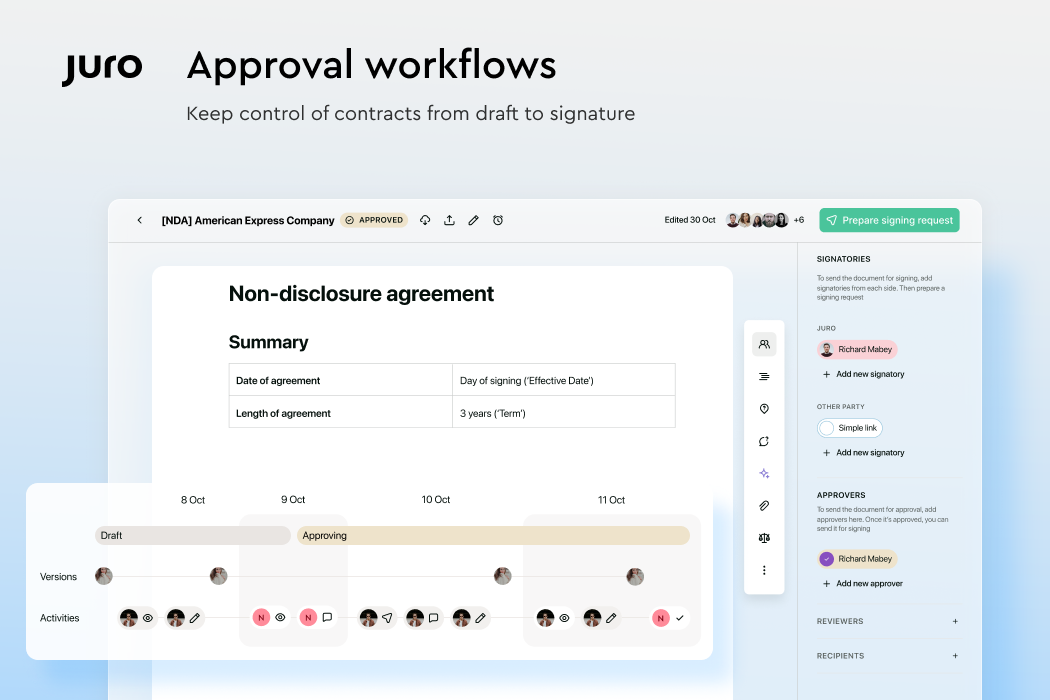
Teams that need to draft, negotiate, and sign without switching between multiple tools will find Juro especially convenient.
Legal, sales, and HR teams can work together in real time, which helps keep the whole contracting process clear and organized from start to finish.
Zoho Sign is a smart pick if your business already uses other Zoho apps like Zoho CRM or Zoho People.
Since it’s part of the larger Zoho suite, it connects e-signatures directly into your existing workflows without extra setup. That makes it easy to keep contracts, approvals, and client records all in one ecosystem.
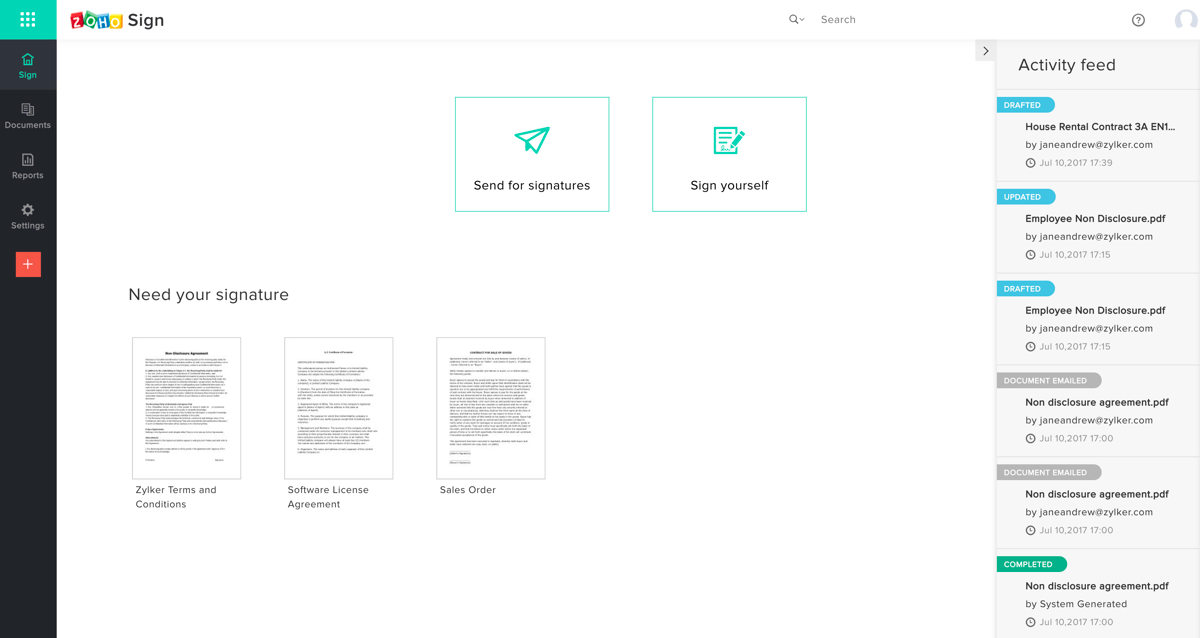
On top of simple signing, Zoho Sign offers advanced workflows that let you route documents, set up automated reminders, and track contract approvals from start to finish. It’s secure, compliant, and designed to work well across industries of different sizes.
Among the many DocuSign competitors, Signeasy has built its reputation on being simple, reliable, and mobile-friendly.
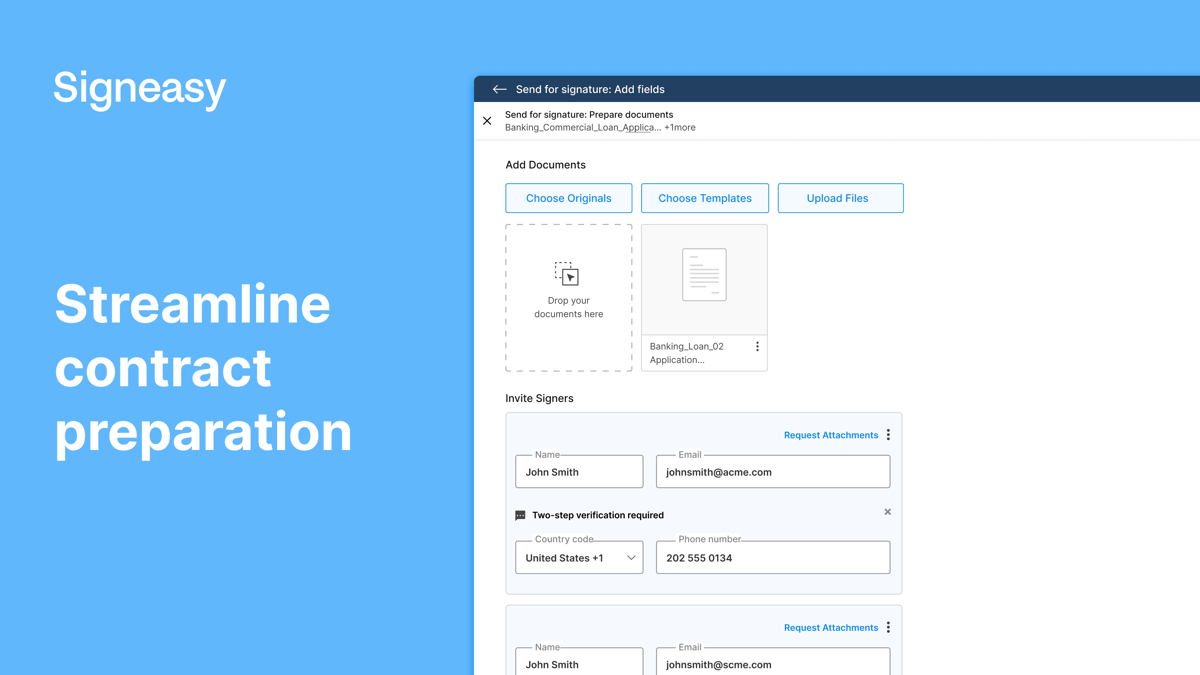
It’s a great option for professionals who need to sign and send contracts quickly, even when they’re away from the office. With a clean design and easy setup, Signeasy makes handling agreements, forms, and approvals straightforward.
OneSpan Sign is for organizations that need more than basic e-signatures. It combines electronic signing with advanced authentication, compliance tools, and detailed tracking. All of this makes it a common choice in industries like banking, insurance, and government.
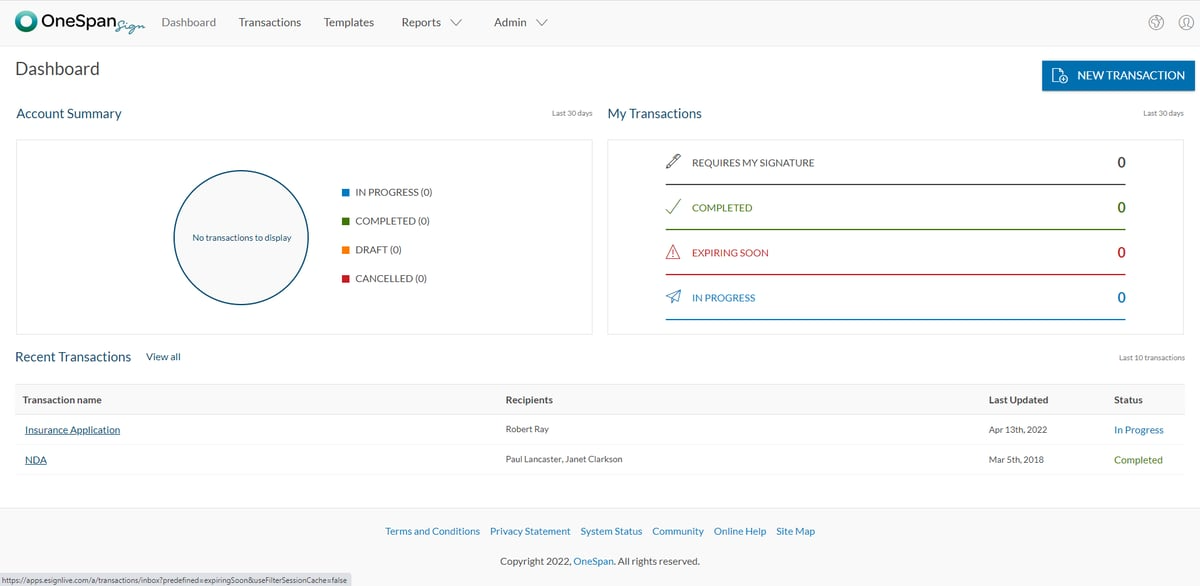
Companies that handle sensitive information value the platform’s flexibility, as it can be deployed in the cloud or on-premises depending on security requirements.
Conga Sign fits naturally into the Conga ecosystem, which many businesses already use for proposals, quotes, and contract management.
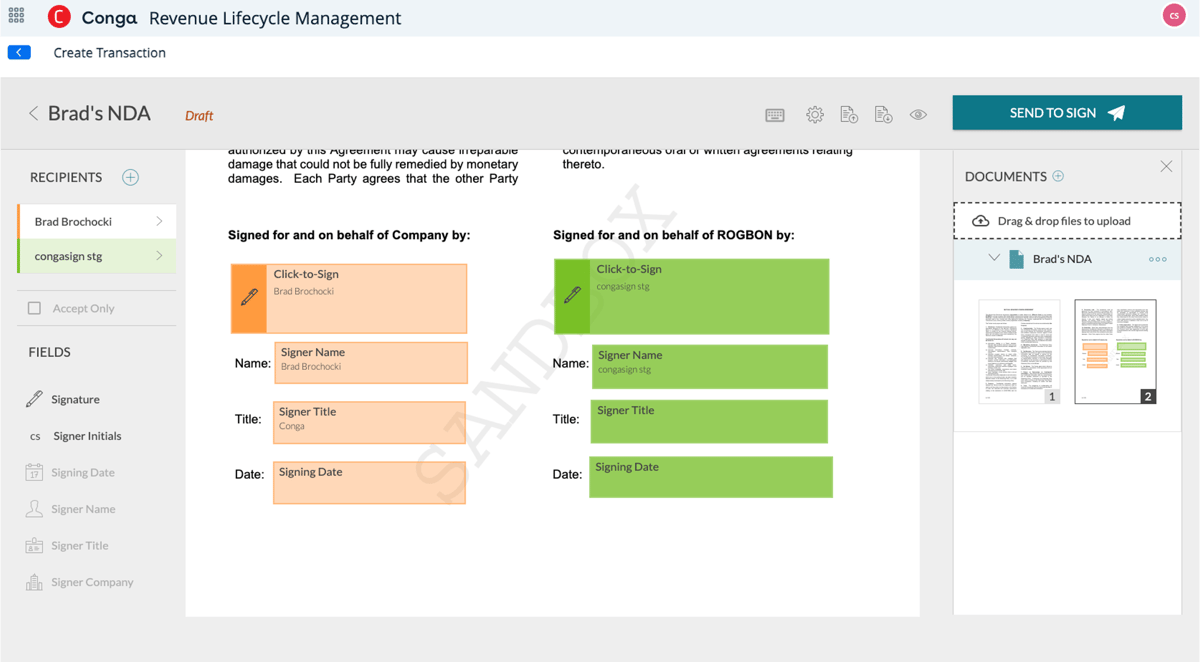
Adding it to the legal workflow means you can create, send, and sign agreements without needing extra tools. Essentially, it’s designed for companies that want e-signatures to work hand in hand with broader business processes.
With easy-to-use features, Conga Sign also supports online forms and structured approvals, which help teams keep agreements consistent as they move through contract review and signing.
The e-signature market is crowded, and picking the right platform takes more than scanning a feature list. When evaluating DocuSign alternatives, the real question is how well a tool supports the full contract process and not just the final signature.

Aline is built for teams that want contracts to move with clarity from beginning to end. Drafting, redlining, negotiation, signing, and post-signature tracking all happen in one place. That means you're not bouncing between disconnected tools.
Unlimited e-signatures remove usage friction. An AI-powered repository keeps every agreement searchable and visible. Structured workflows help legal, sales, and operations stay aligned without extra follow-ups.
On top of that, transparent pricing makes it easier to plan without surprise costs as volume grows.
If you’re ready to go beyond basic signing and manage the entire contract lifecycle with more control and confidence, Aline stands out as the strongest option to consider first.
The best choice depends on your user business needs and how contracts move through your organization. Some teams choose Aline for AI-driven contract workflows, others prefer Adobe Acrobat Sign for PDF-heavy processes, while Signeasy works well for mobile-first use. Each option serves different priorities around volume, collaboration, and control.
DocuSign remains a widely trusted platform, but some users have raised concerns around pricing complexity, lower-tier plans with tighter limits, and support access tied to higher subscriptions. As the market has grown, newer tools have introduced more flexible features, clearer pricing, and broader functionality, which has shifted attention toward alternatives rather than replacing DocuSign outright.
User interface preferences vary, but Aline is often highlighted for bringing drafting, collaboration, and signing into one clear workspace. The layout keeps contract work organized from start to finish, which reduces app switching and helps teams stay focused. Platforms like PandaDoc and Juro are also recognized for clean interfaces, especially for document creation and collaboration.
Several DocuSign alternatives offer more accessible support options, especially on a team plan. Aline, Adobe Acrobat Sign, Zoho Sign, OneSpan Sign, and Conga Sign commonly include chat or phone support on business and enterprise tiers, which appeals to teams that want hands-on help during onboarding or scale-up.

